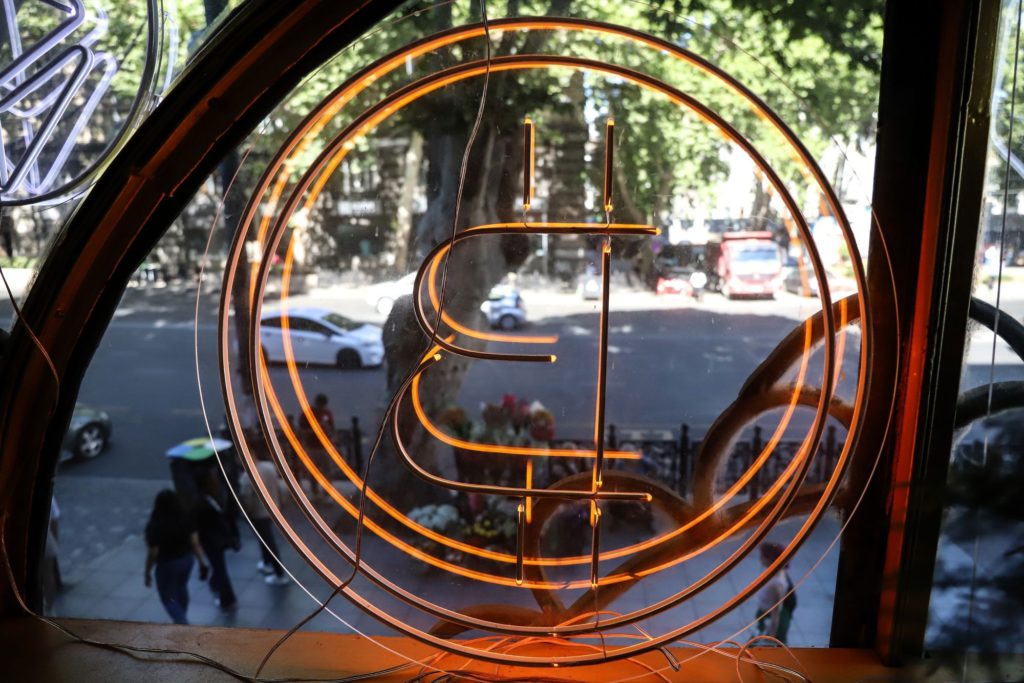The fallout from the collapse of Sam Bankman-Fried’s FTX crypto empire has spread to a new corner of the digital-asset market.
(Bloomberg) — The fallout from the collapse of Sam Bankman-Fried’s FTX crypto empire has spread to a new corner of the digital-asset market.
Traders’ focus has turned to the price disparity between Bitcoin and a derivative of the largest cryptocurrency called wrapped Bitcoin, which can be used on the rival Ethereum blockchain. Wrapped Bitcoin is backed 1-to-1 by the token, which is held in custody by the digital-trust firm BitGo. While it normally trades on par with Bitcoin, a “persistent” discount emerged in mid-November, according to blockchain-data firm Kaiko.
Wrapped Bitcoin, which is ranked as the No. 23 cryptocurrency by total market value, gained popularity during the peak of the decentralized finance boom. The version provides Bitcoin holders an easy way to trade, buy and sell these tokens in DeFi. The Bloomberg Galaxy Crypto Index has tumbled more than 25% since Binance chief Changpeng “CZ” Zhao raised concern about FTX three weeks ago.
The discount has been sparked by concern that the wrapped Bitcoin is not fully backed, given that Alameda Research — the trading desk co-founded by FTX’s Bankman-Fried — was once the biggest merchant to issue the offshoot. Executives at BitGo dismissed the speculation, saying via Twitter that all of the derivative is backed 1-to-1 by Bitcoin held in custody by the firm.
“Everyone is afraid of everything these days,” said Evgeny Gaevoy, founder and chief executive of crypto fund Wintermute.
“The whole point of using a custodian behind wrapped Bitcoin is to prevent the type of failure like FTX,” Mike Belshe, chief executive officer of BitGo, said in an interview. “Now, I realize there’s a little bit of market slippage on the price because of some concerns, which is probably healthy, but it was small, it’s not a depeg. Actually, BitGo is one of a handful of companies out there that’s trying to add market structure. Customers come to BitGo because we’ve been doing this right, we’ve been putting customers first, we’ve been putting security first.”
In the past, when wrapped Bitcoin traded below par to Bitcoin, the discount would create an arbitrage opportunity for traders. Hedge funds would buy the discounted wrapped Bitcoin in the spot market and then redeem it for the higher-priced original cryptocurrency.
But in recent days, disparities such as the one between Bitcoin and wrapped Bitcoin have come under the spotlight as investors and other market participants sift through the rubble left by FTX’s implosion. Unfounded speculation has been especially rampant on Twitter and other social-media platforms, where skeptics have fanned the flames with fear, gossip and even jokes, in a likely attempt to both dismiss and spark chaos within the market.
“There’s tons of FUD and to sort through it, you have to be confident in what you know,” Michael Safai, co-founder of trading firm Dexterity Capital, said in an interview, using the acronym for “fear, uncertainty and doubt.”
Another reason the discount has been persistent was that many funds, who had money stuck on the now-defunct FTX exchange, aren’t able to access capital easily right now, as the trades would require borrowing Bitcoin, according to Gaevoy.
Gaevoy said on Monday that his fund, Wintermute, executed the arbitrage trade and redeemed “some” Bitcoin back. The discount between wrapped Bitcoin and Bitcoin has mostly recovered, based on data from TradingView and Binance.
Data from Dune Analytics show that wrapped Bitcoin saw the biggest monthly redemption event this November, with more than 28,000 wrapped Bitcoin redeemed back to the original coin.
(Updates with comment from BitGo in the sixth paragraph.)
More stories like this are available on bloomberg.com
©2022 Bloomberg L.P.











